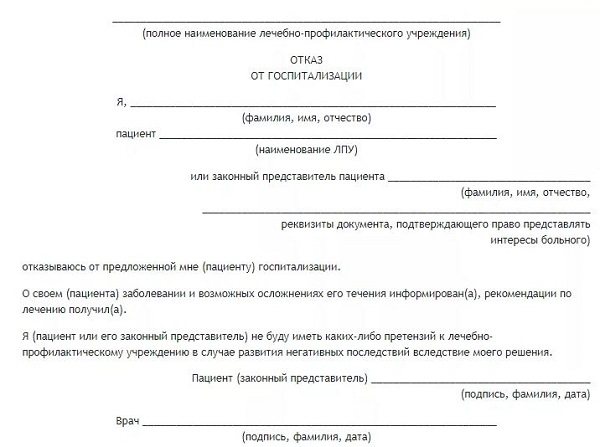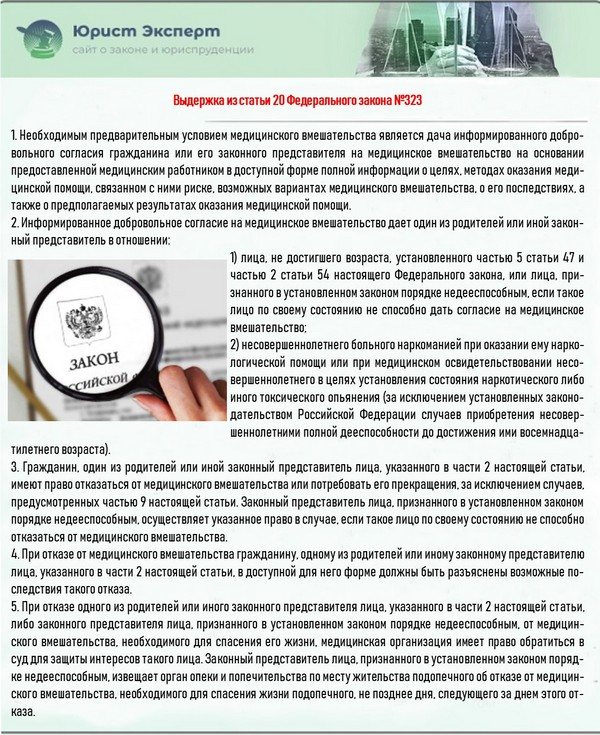Home / Situations
Back
Published: 01/02/2020
Reading time: 3 min
9
4908
– I had a conflict with the doctor, and he refused to help me . The clinic is state-owned, I am a citizen of Russia, I have an insurance policy. Does an employee of a medical institution have the right not to treat a patient?
– The inadmissibility of refusal to provide medical care is one of the main principles of healthcare in our country (clause 7, article 4, article 11 of the Federal Law of November 21, 2011 No. 323-FZ “On the fundamentals of protecting the health of citizens in the Russian Federation”). For failure to provide assistance to a patient, a doctor is subject to liability up to criminal liability (Article 124 of the Criminal Code of the Russian Federation). However, current legislation still provides the doctor with the opportunity to refuse a patient under certain conditions. Such a refusal is governed by the provisions of Part 3 of Art. 70 of the previously mentioned Federal Law No. 323.
- Conditions when a doctor can refuse to treat a patient Condition 1. No threat to the life of the patient or the health of third parties
- Condition 2. Coordination of refusal with the relevant official of the medical organization
- Condition 3. Providing another doctor to the patient by the medical organization
Under what conditions can a doctor refuse a patient?
If we look at existing medical practice, the most popular reasons for refusing treatment are:
- non-compliance of patients with doctor's recommendations;
- psychological incompatibility with the patient;
- family or friendly relationship with the patient, which interferes with full treatment;
- the patient committed an illegal or immoral act, which became the reason for the need for medical care (in this case we are often talking about persons who have committed a criminal offense).
Today, the regulatory regulation of such situations cannot be called complete, since specific grounds and detailed descriptions of the situations do not exist. Thus, any of the above reasons may serve as a basis for transferring the patient to another specialist. Moreover, no one will be able to give an unbiased and qualified assessment of the respectability and weight of the specified reason.
However, in order to refuse, it is also necessary to simultaneously comply with three important conditions:
- No threat to the patient’s life or the health of third parties;
- Coordination of the refusal with the relevant official of the medical organization;
- Provision by a medical organization of another doctor to a patient.
In other words, if a doctor’s refusal to treat a patient could cause his death or significant deterioration in health, then refusal is impossible. But there are nuances here: for example, the only surgeon in a region remote from other medical institutions does not have the right to refuse to perform an operation. If we are talking about performing an abortion at the request of the patient, and not for medical reasons, refusal is possible.
In addition, the manager must agree to transfer the patient to another medical specialist. But here, too, questions arise: in what form should consent be obtained, who gives it - the chief physician or the head of the department? All these aspects are not clearly stated in the current version of the law, which causes its own difficulties.
Refusal of a patient is impossible if the medical organization cannot provide a replacement specialist. At the same time, it is important to note one important fact: if the doctor is the only specialist in the field, then the management can look for a replacement for him outside of his institution. To do this, it is possible to conclude a fixed-term employment contract or a civil law contract for the provision of certain services.
Also, the law does not regulate the question of how and within what time frame the replacement should be carried out.
When should you be hospitalized for coronavirus?
The main criteria that influence a doctor’s decision to hospitalize a coronavirus patient:
- degree of severity of signs of ARVI;
- blood oxygen level is normal from 95% inclusive;
- body temperature is the borderline value of 38 degrees.
- respiratory rate - normal up to 22 per minute;
According to the order of the Ministry of Health of the Russian Federation No. 459n dated March 19, 2020, hospitalization of a person infected with coronavirus is required in the following cases:
- Mild acute respiratory viral infection in persons over 65 years of age and with chronic diseases in violation of the two above criteria;
- ARVI of moderate or severe severity in other groups of people if the two above criteria are violated.
These groups of people should be hospitalized in a hospital for constant monitoring and emergency care if necessary.
All others (asymptomatic, with mild ARVI in citizens under 65 years of age and without chronic diseases) can be treated at home. A doctor comes to them, writes out a sick leave, and also takes a smear for Covid. Citizens' data is released after two negative coronavirus test results with an interval of at least one day.
Is it possible to refuse treatment and stay at home?
Is it possible, if there are indications, to refuse hospital treatment and sit at home and treat yourself?
If the test for coronavirus is positive, that is, the diagnosis of COVID-19 is confirmed, and the person, according to Order of the Ministry of Health No. 198n, falls into the group subject to hospitalization, then the citizen is asked to go to the hospital for treatment.
There is Article 20 of Law No. 323-FZ, which states that a person cannot refuse medical intervention if he is sick with a disease that is dangerous to others.
The list of such diseases was approved by Decree of the Government of the Russian Federation No. 715 of December 1, 2004; the last item on this list includes coronavirus infection.
That is, according to Article 20 of Law No. 3230FZ, with a confirmed diagnosis of Covid, a person cannot refuse treatment and must obey the legislative acts establishing the procedure for treating citizens with such a disease. In particular, he must undergo hospitalization in cases where this is established by Order No. 459n.
To hospitalize a person without his consent, the doctor only needs to have a positive test result for coronavirus, and also make sure that the disease poses a danger to the person - he has signs of acute respiratory viral infection, the level of oxygen in the blood is low and is less than 95%, and also manifests although one of two criteria: frequent breathing frequency - from 22 times per minute or temperature from 38 degrees.
If there is no confirmed diagnosis of coronavirus, that is, there is no positive test for covid, then according to Article 20 of Law No. 323-FZ, it is impossible to hospitalize a person without his consent, even if the above symptoms appear.
It turns out that before admitting a person to the hospital for treatment, you must first take a swab for coronavirus and wait for the result, then make decisions.
As for testing for Covid, a person can refuse to have it carried out if he is not a contact person with a coronavirus patient, has not been diagnosed with community-acquired pneumonia, has not been abroad, and is not a pensioner over 65 years old who has suffered from ARVI. That is, you can easily write a refusal to take tests if it is offered by the employer as part of periodic testing, if there is no order from Rospotrebnadzor about contact with a sick person.
We recommend reading the article:
- Can a person refuse to take a coronavirus test?
- Is it possible to refuse the COVID 19 vaccine?
There is another legislative act - clause 1 of Article 33 of Law No. 52-FZ states that persons with infectious diseases, suspected of such diseases and those in contact with them must be examined, and if there is evidence and pose a threat to others, they must be hospitalized or isolated. That is, a person has a choice - hospitalization or isolation.
Clause 6 of Article 51 of Law 52-FZ states that chief sanitary doctors and their deputies, if there is a threat of the spread of infectious diseases, have the right to make reasoned decisions on hospitalization or, as an alternative, isolation. The conclusion from this is that compulsory hospitalization requires a reasoned decision, and hospitalization can be replaced by isolation.
Based on all of the above, we can conclude that a person can refuse hospitalization without any restrictions:
- if there is no positive test for coronavirus;
- if there is a positive test for Covid, but there are no health reasons in accordance with Order No. 198n, such citizens are subject to isolation, that is, they must stay at home and receive treatment.
If the condition is dangerous and serious, the coronavirus is confirmed, but the person still does not want to go to the hospital, then the doctor cannot forcibly take him away. Only a court decision can force a person to go to hospital.
We do not recommend refusing hospitalization if you are a pensioner over 65 years old or a person with severe symptoms of ARVI and at the same time blood oxygen saturation up to 95%, rapid breathing (over 22 per minute) and a high temperature (from 38 degrees).
Coronavirus can develop unnoticed and rapidly; it is good if there is a doctor nearby who can provide emergency care in intensive care conditions.
How to write a refusal if the test is positive?
If the test for coronavirus is positive, but the symptoms of ARVI are mild, then you can refuse the proposed hospitalization and sit at home in isolation until recovery, while monitoring your health. For any deterioration, you need to call a doctor at home.
To refuse, you need to write a written refusal in the presence of a doctor and certify it with your signature.
As a rule, the refusal is drawn up according to a standard form provided by the doctor.
Sample waiver:

If breathing is frequent and heavy, the temperature is high, the level of oxygen in the blood is low, the symptoms of ARVI are severe (cough, runny nose, sore throat, weakness, muscle aches), then you should definitely go to the hospital if the doctor suggests it. This is especially true for older citizens, pregnant women, and those with chronic diseases.
Timely hospitalization can save lives; this should not be neglected.
How to act in case of illegal refusal?
If a patient is faced with an illegal refusal of treatment by a doctor, then his actions should be as follows:
- It is necessary to write a statement addressed to the head physician of the medical institution, where all the facts will be presented. Quite often this is enough to solve the problem - the organization either returns the doctor or makes a replacement;
- pre-trial claim. It is drawn up if the issue has not been resolved, and the doctor’s inaction has caused damage to your health;
- going to court or the police. Criminal prosecution authorities will conduct an investigation and may bring the case to court. If the goal is compensation for damage caused, then it is better to start with a statement of claim in court.
Hospital refusal to attach a citizen

The norms of Federal legislation require serious revision, since in a number of cases they contradict each other. While granting the right to citizens to choose any medical clinic (Article 21), at the same time there is a norm of separation on a territorial basis. Its essence is as follows:
- the medical organization receives only persons residing or temporarily staying in a certain territory,
- a person can obtain consent for treatment and examination if he works or studies in an organization attached to a given hospital institution.
Based on this, the doctor has the right to refuse patients who are served in another hospital. This fundamentally violates human rights, and based on these facts, appeals are made to the courts of appeal, according to which the plaintiffs are able to choose the desired clinic and obtain moral compensation.
Want to know more?
If you are interested in medical law and want to know more about the nuances of the relationship between a doctor, a medical organization and patients within the legislative framework of Russia, then Polina Gabay’s original educational seminar “Medicine and the Law. Everything about the legal relationship between the clinic and the patient: document flow, rights and responsibilities of the parties, claims and suits of patients, judicial practice” - for you. The event will take place on January 26, 2020.
The program of the educational event is quite rich and includes all the current and pressing issues of medical law:
- Legal responsibility of the doctor and medical organization;
- Quality and safety of medical services;
- Claims and claims of patients against a medical organization;
- Rights of the patient-consumer of medical services;
- Categories of patients and their representatives;
- Telemedicine in the light of the new law;
- Patient information rights;
- Medical confidentiality and personal data of the patient;
- Refusal of treatment and treatment;
- Paid medical services.
Registration for participation in the author’s seminar from Polina Gabay “Medicine and the Law. Everything about the legal relationship between the clinic and the patient: document flow, rights and responsibilities of the parties, claims and lawsuits from patients, judicial practice,” which will take place on January 26, 2020, is still open.
Grounds for failure to provide medical services
Does a doctor have the right to refuse a patient? The answer to this question is clearly stated in Federal Law 323 of Russia.

The following cases will serve as the basis for this:
- If a health worker finds himself in a situation that excludes the possibility of providing medical treatment (it is impossible to reach the patient). This becomes possible due to natural disasters, emergency road accidents, or in the event of military conflicts.
- Due to illness of a health worker.
- When exposure to physical or mental methods leads to incapacitation of medical personnel.
- If the necessary instruments or medications for carrying out procedures or manipulations are not available.
- When, for one reason or another, the patient independently refuses treatment, or such a decision is made for him by close relatives.
- A patient must be denied medical services in cases where he ignores medical recommendations, systematically violates hospital regulations, or exhibits inappropriate actions in his actions. In the latter case, the patient may pose a threat to himself and others. Therefore, in such situations, it becomes necessary to treat the patient forcibly, and be sure to notify relatives about this.
It is important to know that after a written refusal from the patient, which is submitted to a superior manager, the patient will be given the opportunity to undergo all medical procedures and studies under the supervision of another doctor.
What are the consequences of refusing to treat a child?
When filing an application, the legal representatives of the minor assume full responsibility for the state of his health. In this case, the medical institution has the right to go to court at the request of a third party for the unlawful deprivation of a child of necessary medical care, if this poses a threat to the health/life of the patient.
If there are grounds, the parent (legal representative) of a minor may be subject to liability measures, including criminal penalties if serious consequences arise.
When is it permissible not to serve a client?
In order to refuse to carry out therapeutic measures in relation to a patient, the doctor must inform the management in writing. However, according to the new legislation, he is not obliged to provide the reason for his refusal.
The main thing is that 2 conditions are met:
- no need for emergency assistance,
- advance notification to superiors.
The patient is also allowed to refuse in favor of a particular practitioner. At the same time, he may not voice his reason for mistrust, and he also does not need written explanations.
Patient Actions
In order to objectively assess the harm caused to the victim, it is necessary to undergo an examination.
- When the presence of harm is not established, the conclusion is transferred to the administration of the medical institution from which the refusal occurred. The administration makes a decision to send the victim for treatment and informs the health insurance fund that issued the policy to the victim (TFOMS or SMO) about this. In addition, a copy of the complaint can be sent to Rosnadzor.
- When harm is detected, the results of the examination are sent to the legal service of the insurance organization, whose employees formulate a claim against the hospital administration. If no disputes arise, the medical institution compensates for the damage.
- When the administration does not agree with the claim of the SMO or TFOMS, in order to obtain compensation for damage, it should act through the court. Also, the insurance company is raising the issue of initiating a criminal case against the doctor, whose refusal to provide assistance led to disastrous consequences. In this case, a statement is filed with the police.
In cases of the need to provide emergency medical services, you need to call an ambulance, which even goes to patients without insurance.
The dispatcher receives calls and orders the dispatch of ambulances. It also classifies the urgency of the call. Therefore, responsibility for the car not arriving or arriving at the wrong time rests with him. And if a person is injured or killed as a result of the ambulance being late, the dispatcher will be punished under Article 293 of the Criminal Code of the Russian Federation “Negligence”.
Next, we will tell you about how to file a claim for refusal to provide medical care or refusal of an ambulance to hospitalize you.
Registration of refusal
If doctors do not have compelling reasons to keep the patient for treatment in their clinic and if the patient wishes to be discharged, he is provided with a refusal form. Such a document has a strictly established form. And you can get it at the reception desk or from the attending physician at the medical institution where the person is receiving treatment.
The procedure for completing this application will be as follows:
- We indicate the full legal name of the medical institution. If you do not know it, it is better to check with your doctor or nurse first. Some medical institutions include this information on the form itself in advance.
- We indicate your personal data. Here you just need to enter your full name.
- If a parent or other person makes such a decision for his child or ward, then we also indicate his full name.
- If the application is signed by a representative, then we also indicate the details of the document confirming his right to perform these actions.
- We register which health care facility this patient is a patient of.
- We put a signature and date.
The text of the refusal itself states that the patient was informed of possible complications that may arise as a result of his refusal to receive treatment. And the applicant signs a waiver in advance that he has no claims against the medical institution if he experiences negative consequences.
Thus, the sick person removes all responsibility for his health from the doctor and begins to be responsible for it independently.
Consequences of failure to register an ID for a medical institution
The legal consequences of evading written documentation of the IDO are administrative sanctions.
The presence of IDO (informed voluntary refusal), as well as IDS (informed voluntary consent) is one of the licensing requirements regulated by the fifth paragraph of the Russian Government Decree “On licensing of medical activities” number 291 of April 16, 2012.

Both consent and refusal must be in writing
A warning is issued and the organization's activities are suspended. The largest fine for a legal entity is 200 thousand rubles.
In addition, such a violation may be taken as a violation of the consumer’s rights to provide necessary and truthful information about medical services. In this case, the largest fine is 10 thousand.
Naturally, society will not leave such an incident unnoticed, so the reputation of the medical institution may be damaged.
So, refusal of medical intervention can be issued either by the patient himself or by the person who represents him. In this case, a person must understand the consequences and take responsibility for what may happen to health later.
An example from judicial practice

A clear example is a case from judicial practice in which an emergency department doctor was prosecuted.
After a shift in the mine, citizen Petrov and his friends drank a fair amount of alcohol, which caused a fight, as a result of which he lost consciousness. Despite severe abdominal pain, the emergency room doctor did not attach any importance to this, and attributed the short-term loss of consciousness to the effects of alcohol.
After the injection of an anesthetic drug, the patient was sent home. He went to rest, he felt worse, the pain resumed, which is why he died in the morning as a result of extensive internal bleeding. The doctor made a mistake because he did not fully examine the patient and did not take into account that the effect of alcohol masks the clinical picture of acute pathological processes.
The doctor was charged with Article 124 of the Criminal Code of the Russian Federation and sentenced to 4 years in prison. In addition, he lost the right to practice medicine.
General rules
By law, any citizen can refuse hospitalization. However, there are several exceptions to this rule. Refusal from hospitalization is impossible if:
- The need to carry out urgent actions aimed at stabilizing a person’s condition in emergency situations when the person is unable to independently express his will.
- Conducting forensic medical examinations in the process of investigating criminal cases.
- The presence of mental pathology or disease that poses a danger to others.
- Commitment by a citizen of a gross violation of the provisions of the current legislation.
In these situations, compulsory medical measures or emergency medical care are applied to the subject. In all other cases, a citizen can issue a refusal to be hospitalized.
Special legal requirements
Law No. 323-FZ especially protects the rights of patients in relation to whom citizens representing their interests refuse medical intervention required to preserve their health.
Based on the fifth part of Article 20 of the said Law, if a parent (or other officially designated representative) refuses medical care that allows maintaining a person’s life, then it would be advisable for the clinic to go to court so that the patient’s rights are protected.
Important! In addition to the above, an official representative of a person officially considered incompetent must notify the guardianship and trusteeship authority at the person’s address of residence about the decision to suspend medical care required to preserve the patient’s life no later than the date following the date of this refusal.

Excerpt from Article 20 of Federal Law No. 323
Sample refusal of hospitalization
The application is written to the head physician of the relevant medical institution. The hospitalization refusal form shall indicate:
- Full name of the applicant.
- Full name of the citizen for whom the document is being drawn up. For example, a refusal to hospitalize a child is made by his parents or other legal representatives.
- Information confirming the absence of a requirement on the part of the patient to provide him with medical services.
- List of attached documents.
In essence, a refusal to hospitalize is a document that relieves health workers of responsibility for the patient’s condition.
Situations for forced medical examination
In some cases, the right to disagree with medical intervention is not allowed, i.e., medical procedures will be carried out regardless of the person’s statements. This rule is established in Federal Law No. 323 - Article 20 Part 3.
Part 9 of the same article states that medical procedures are mandatory if:
- Such actions are required by an emergency situation - the risk of death, the inability of an individual to realize what is happening, and, therefore, to express his will. In addition, doctors can act at their own discretion in the absence of legal representatives - Article 20 part 2.
- If a citizen suffers from a disease that poses a danger to the population.
- The person has a pronounced mental disorder, which poses a threat to others.
- If a person has committed a criminal act.
- At the time of the forensic examination, including psychiatric examination.
Note: when carrying out compulsory medical examination at a mental health clinic, employees of the organization and authorized persons are guided by Art. 29 Federal Law No. 3185-1 dated July 2, 1992.
Law of the Russian Federation of July 2, 1992 N 3185-1 “On psychiatric care and guarantees of the rights of citizens during its provision”
Read also: Target direction to university









